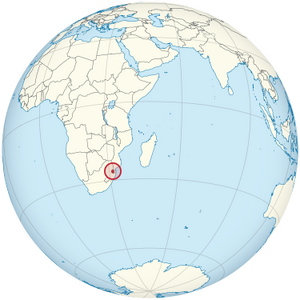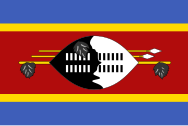Eswatini
| Kingdom of Eswatini (Formerly known as Swaziland) |
|
and Lobamba (legislative) |
Source information is available at [ Sources ] |
Eswatini, officially the Kingdom of Eswatini and also known by its former official name Swaziland and formerly the Kingdom of Swaziland, is a landlocked country in Southern Africa. Mozambique borders it to its northeast and South Africa to its north, west, south, and southeast. At no more than 200 km (120 mi) north to south and 130 km (81 mi) east to west, Eswatini is one of the smallest countries in Africa; despite this, its climate and topography are diverse, ranging from a cool and mountainous highveld to a hot and dry lowveld.
See also [ Swaziland ]
The population is composed primarily of ethnic Swazis. The prevalent language is Swazi (siSwati in native form). The Swazis established their kingdom in the mid-18th century under the leadership of Ngwane III. The country and the Swazi take their names from Mswati II, the 19th-century king under whose rule the country was expanded and unified; its boundaries were drawn up in 1881 amid the Scramble for Africa. After the Second Boer War, the kingdom, under Swaziland, was a British high commission territory from 1903 until it regained its complete independence on 6 September 1968. In April 2018, the official name was changed from the Kingdom of Swaziland to the Kingdom of Eswatini, mirroring the name commonly used in Swazi.
Eswatini is a developing country classified as having a lower-middle-income economy. As a member of the Southern African Customs Union and the Common Market for Eastern and Southern Africa, its main local trading partner is South Africa; to ensure economic stability, Eswatini's currency, the lilangeni, is pegged to the South African rand. Eswatini's major overseas trading partners are the United States] and the European Union. Its agricultural and manufacturing sectors provide most of the country's employment. Eswatini is a member of the Southern African Development Community, the African Union, the Commonwealth of Nations, and the United Nations.
The government is an absolute monarchy, the last of its kind in Africa, and has been ruled by King Mswati III since 1986. Elections are held every five years to determine the House of Assembly and the Senate majority, but political parties are prohibited from running. Its constitution was adopted in 2005. Umhlanga, the reed dance held in August/September, and incwala, the kingship dance held in December/January, are the nation's most meaningful events. The Swazi population faces major health issues: HIV/AIDS and (to a lesser extent) tuberculosis is widespread. Twenty-eight percent of the adult population is HIV-positive. As of 2018, Eswatini has the 12th-lowest life expectancy in the world, at 58 years. The population of Eswatini is young. As of 2018, people aged 14 years or younger constitute 35% of the country's population, and the median age is 22.
Spanking and Spanking Art in Eswatini
( We have no further information from SAOTK as of Oct, 2024 )
JCP in Swaziland from Corpun.com
Courts in Swaziland could, until 2012, order male juveniles under 18 to be caned (Criminal Procedure and Evidence Act 1938, amended 2005). As far as can be ascertained, this punishment might be awarded for any offense, generally, instead of imprisonment. It was delivered to the boy's buttocks in private with a light cane after a medical examination by a doctor. The parent or guardian might be present if desired. It is unclear whether the offender got to keep his pants on.
Typical would appear to be these July 1999 cases (four strokes each for theft).
Less typical was this February 2005 case in which a 16-year-old was ordered six strokes for stabbing a bus conductor, who later died. This seems a very lenient penalty for manslaughter, and the press report notes that the boy was lucky not to be jailed.
One case that attracted international attention was that of three baboons who conducted a year-long reign of terror against women. Suspicions were aroused when it was observed that the baboons were speaking English. When caught, they turned out to be teenage boys in baboon suits. As noted in this July 2001 news report, two received caning sentences -- a singularly appropriate outcome, one might think, given that baboons are famous for their bright red rear ends.
An apparent oddity is this Jan 2000 case, in which a 20-year-old youth was sentenced to six strokes of the cane for assaulting his mother, presumably under some legislation other than the juvenile provisions mentioned above.
Allott (1970) records that 1st- and 2nd-class subordinate courts in Swaziland were empowered to order a maximum of 8 cane strokes.
Prostitution in Eswatini
- Prostitution in Eswatini ↗ on Wikipedia
External links
- More information is available at [ Wikipedia:Eswatini ]
Chat rooms • What links here • Copyright info • Contact information • Category:Root

